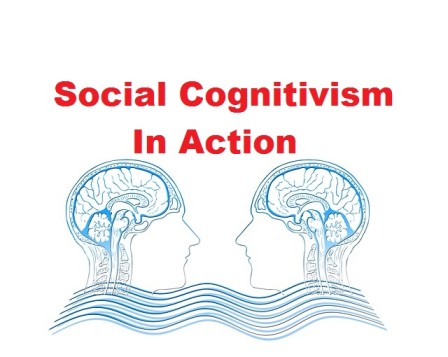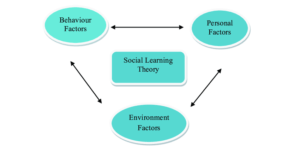Social Cognitivism Theory
Social cognitivism refers to a theory that was developed by the Canadian psychologist, Albert Bandura. His work is considered very indispensable because it serves as a linking bridge between behaviorists’ assumptions of learning and cognitivists’ insights about mental and cognitive development.
Unlike skinner’s operant conditioning which explains that behavioral learning takes place when there is a connection between environment and behavior, Bandura claims that for learning to successfully takes place, there must be a connection between behavior, environmental and personal factors. For Bandura, there is a mutually influential relationship between these three elements. Every single element influences the other. Just as the environmental factors influence the behavior, the latter influences the environment.
Within social cognitivism, there are two important concepts that completely sparked my interest. These concepts are: self-efficacy and observational learning and they are very foundational to the understanding of the theory. Therefore, what remains of this article is devoted to an extensive explanation, practical examples, and the utility of such concepts.
Bandura defines self-efficacy as the individual’s own expectations and judgments about his/her capabilities to manage prospective situations. This basically shows the way a person behaves can be better predicted by the beliefs he/she holds about his/her potential capabilities than what he/she is actually capable of doing because these self-perceptions are of great support for crystallizing what the individuals can do with or without the knowledge and the skills they have.
This can have many important implications for EFL teachers in any context. One of these implications is that there must be a focus on students’ beliefs as an important component in academic instruction. If the beliefs that students create; develop and hold play an integral role in their academic success or failure, then more attention should be brought to this area. More research should be done to reach a comprehensive understanding of what happens inside the learners’ minds as this exerts a remarkable effect on learning. From my personal standpoint, if teachers and parents really have a microscopic understanding of self-efficacy, then they can provide great support to learners. They will teach students to have high self-efficacy and to see obstacles as opportunities rather than threats.
When I was a student, I used to have an amazing teacher who used to teach us some principles of self-efficacy. At that time, I didn’t realize that it was about self-efficacy, but I was totally aware that success starts in the mind before it can be manifested in reality. My teacher most often used to say a wonderful quote which is said by Napoleon Hill, ‘’whatever the mind can conceive and believe, the mind can achieve’’ to inspire us and teach us the power of self-motivation, obsession, and faith.
In light of this past experience, I propose that teachers can integrate the teaching of such principles into students’ learning. Teaching students how to motivate themselves and guide their actions by visualizing success. Further, I suggest that practitioners and language teacher trainers can integrate this to be an essential part of the teachers’ training in the training centers. This can allow pre-service teacher trainees to develop deep knowledge about how self-efficacy can positively affect students’ achievements.
The second concept that relates to social cognitivism is observational learning. This, according to Bandura, is the kind of learning that happens through observing others. This means that people acquire knowledge, beliefs, strategies, and skills by observing others. The construct of observational learning can have a wide range of possible implications in the EFL context. It essentially implies that students learn a lot from their teachers just by observing them.
Teachers must do their best to be good models that inspire students. Teachers must be aware of the basic distinction between learning and performance. Just because students can’t perform a particular behavior, it doesn’t mean they haven’t learned it. According to Bandura, when the child observes a particular behavior but makes no reaction, the child may still have acquired the modeled behavior in some sort of cognitive shape. This again shows that teachers must behave appropriately in the class and represent good models for students to learn from. For this to be achieved, teachers must be familiar with the processes that are involved in observational learning.
All things considered, social cognitivism theory has presented some of the powerful arguments about learning and introduced some of the significant ideas into the educational realm such as environmental and observational learning. This, in turn, requires teachers to be the best models for students and try to create an appropriately engaging environment where learning can take place.
References:
- Bandura, A. (1977). Social Learning Theory. New York: General Learning Press.


 source
source




